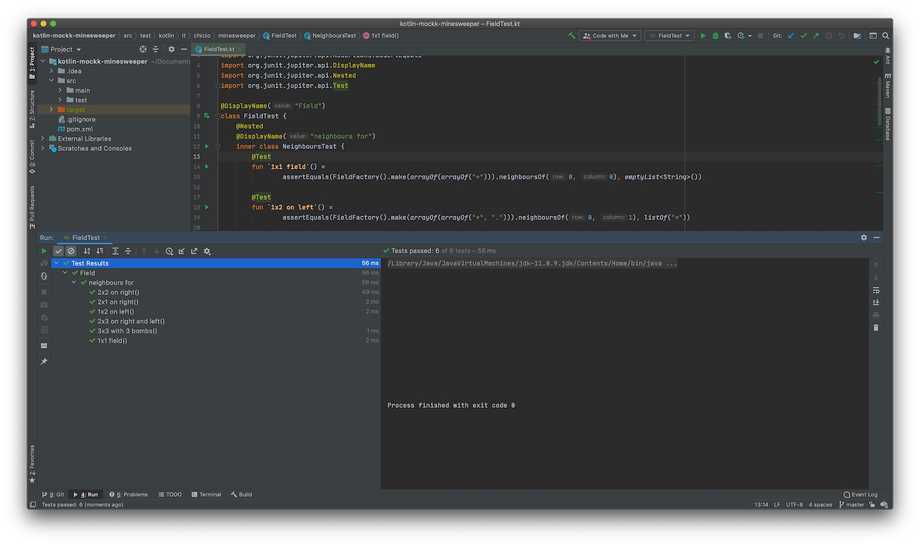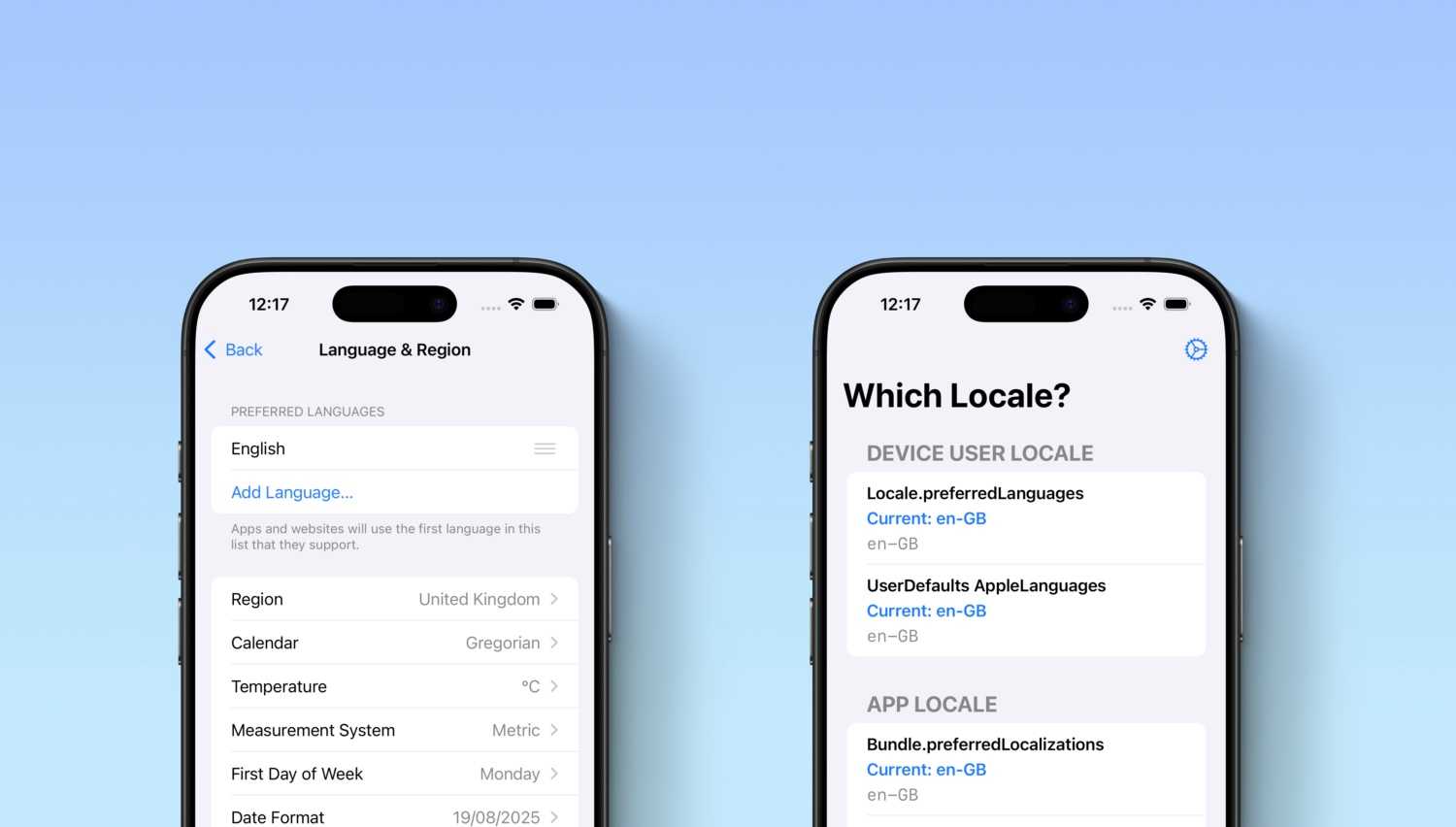As I told you in my last post, in the last months I wrote a lot of Kotlin backend code during my daily job. Usually I develop new stuff using Test Driven Development (TDD) technique. Specifically, most of the time I use the mockist approach. This basically means that I need a mock library. For Java there are JMock and Mockito, and in fact I usually use Mockito. It is possible to use this library with Kotlin but it has some limitations. So I started to wonder if there was an alternative, and I found that in lastminute.com group we were already using MockK, a mocking library “written in Kotlin for Kotlin” . In this post I will show you how to use MockK and JUnit 5 to improve you unit tests. To do this, I will migrate to Kotlin + MockK + JUnit 5 an old kata I did some time ago in Java + Mockito: the Minesweeper. So let’s start!!
Implementation
Let’s start from the installation. For this kata I used maven to manage my dependencies. To install JUnit 5 I used the JUnit 5 Bill of materials, usually abbreviated to BOM. If you don’t know what a BOM is, you can find the definition below (keep in mind that BOM is a general concept that you can find also in other build systems e.g. Gradle).
BOM is a special kind of POM that is used to control the versions of a project’s dependencies and provide a central place to define and update those versions. BOM provides the flexibility to add a dependency to our module without worrying about the version that we should depend on.
The installation of MockK was easy. The only thing I needed to do is just to add the dependecy to the pom file. Below you can find the entire pom file.
<?xml version="1.0" encoding="UTF-8"?>
<project xmlns="http://maven.apache.org/POM/4.0.0"
xmlns:xsi="http://www.w3.org/2001/XMLSchema-instance"
xsi:schemaLocation="http://maven.apache.org/POM/4.0.0 http://maven.apache.org/xsd/maven-4.0.0.xsd">
<modelVersion>4.0.0</modelVersion>
<properties>
<maven.compiler.source>11</maven.compiler.source>
<maven.compiler.target>11</maven.compiler.target>
<kotlin.version>1.4.21</kotlin.version>
</properties>
<groupId>it.chicio.minesweeper</groupId>
<artifactId>minesweeper</artifactId>
<version>1.0</version>
<dependencyManagement>
<dependencies>
<dependency>
<groupId>org.junit</groupId>
<artifactId>junit-bom</artifactId>
<version>5.7.0</version>
<type>pom</type>
<scope>import</scope>
</dependency>
</dependencies>
</dependencyManagement>
<dependencies>
<dependency>
<groupId>org.junit.jupiter</groupId>
<artifactId>junit-jupiter</artifactId>
<scope>test</scope>
</dependency>
<dependency>
<groupId>io.mockk</groupId>
<artifactId>mockk</artifactId>
<version>1.10.4</version>
<scope>test</scope>
</dependency>
<dependency>
<groupId>org.jetbrains.kotlin</groupId>
<artifactId>kotlin-stdlib-jdk8</artifactId>
<version>${kotlin.version}</version>
</dependency>
</dependencies>
<build>
<plugins>
<plugin>
<groupId>org.jetbrains.kotlin</groupId>
<artifactId>kotlin-maven-plugin</artifactId>
<version>${kotlin.version}</version>
<executions>
<execution>
<id>compile</id>
<phase>compile</phase>
<goals>
<goal>compile</goal>
</goals>
</execution>
<execution>
<id>test-compile</id>
<phase>test-compile</phase>
<goals>
<goal>test-compile</goal>
</goals>
</execution>
</executions>
<configuration>
<jvmTarget>1.8</jvmTarget>
</configuration>
</plugin>
<plugin>
<groupId>org.apache.maven.plugins</groupId>
<artifactId>maven-compiler-plugin</artifactId>
<executions>
<execution>
<id>compile</id>
<phase>compile</phase>
<goals>
<goal>compile</goal>
</goals>
</execution>
<execution>
<id>testCompile</id>
<phase>test-compile</phase>
<goals>
<goal>testCompile</goal>
</goals>
</execution>
</executions>
</plugin>
</plugins>
</build>
</project>The migration to Kotlin of the project was easy with IntelliJ IDEA: I just launched the automatic conversion tool that you can find in the menu Code -> Convert Java File to Kotlin File and than fix some problem on the code obtained. In particular, given the fact that there weren’t nullability annotations, all the fields of all the classes were created as optional.
After the conversion I started to rewrite all the tests. Let’s start to see how I rewrote the FieldTest, a test without mocks where I just needed to migrate from JUnit 5. In this test suite you can find some tests for the neighboursOf method of the Field class. This method returns a list containing the cell statuses for the neighbours of a cell received as parameter (identified by its row and column position). The Java version of this test was just a list of methods with the @Test annotation. Anyway, in JUnit 5 there are some annotations that can help you to improve test naming and to organize them:
@DisplayName("< New Name>"), an annotation used to declare a custom display name for the annotated test class or test method. These names are typically used for test reporting in IDEs and build tools and may contain spaces, special characters, and even emoji.@Nested, an annotation used to signal that a class is a nested, non-static test class (i.e., an inner class) that can share setup and state with an instance of its enclosing class.
In addition to these annotations, I used some Kotlin features:
- backticks to define test method (again, you can use this feature only for tests, not in your production code).
- body expression, a feature that let you avoid writing curly brackets if you method body contains just one line of code.
Last but not least, I also switched from the assertThat method and its matchers to assertEquals method, that is more developer friendly in terms of error messages when your tests fail. Below you can find the final result.
package it.chicio.minesweeper
import org.junit.jupiter.api.Assertions.assertEquals
import org.junit.jupiter.api.DisplayName
import org.junit.jupiter.api.Nested
import org.junit.jupiter.api.Test
@DisplayName("Field")
class FieldTest {
@Nested
@DisplayName("neighbours for")
inner class NeighboursTest {
@Test
fun `1x1 field`() =
assertEquals(FieldFactory().make(arrayOf(arrayOf("*"))).neighboursOf(0, 0), emptyList<String>())
@Test
fun `1x2 on left`() =
assertEquals(FieldFactory().make(arrayOf(arrayOf("*", "."))).neighboursOf(0, 1), listOf("*"))
@Test
fun `2x1 on right`() =
assertEquals(FieldFactory().make(arrayOf(arrayOf(".", "*"))).neighboursOf(0, 0),listOf("*"))
@Test
fun `2x2 on right`() =
assertEquals(
FieldFactory()
.make(
arrayOf(
arrayOf(".", "*"),
arrayOf("*", "*")
)
)
.neighboursOf(0, 0),
listOf("*", "*", "*")
)
@Test
fun `2x3 on right and left`() =
assertEquals(
FieldFactory()
.make(
arrayOf(
arrayOf("*", ".", "*"),
arrayOf("*", "*", "*")
)
)
.neighboursOf(0, 1),
listOf("*", "*", "*", "*", "*")
)
@Test
fun `3x3 with 3 bombs`() = assertEquals(
FieldFactory()
.make(
arrayOf(
arrayOf("*", "*", "*"),
arrayOf("*", ".", "*"),
arrayOf("*", "*", "*")
)
)
.neighboursOf(1, 1), listOf("*", "*", "*", "*", "*", "*", "*", "*")
)
}
}Cool, isn’t it ? If I run this test in IntelliJ IDEA I can see the feedback about my test results (It seems almost a list of BDD behavioural tests). If you ever tried to develop something with Jest on the frontend side of the web development world, you will feel at home.
Let’s move to a new test to see MockK in action. FieldsResolverByIteratingThroughThemTest seems a good example where I can show the basic building blocks MockK.
The first thing I did was to create the mocks needed by the class under test. In contrast to the Runner, TestRule, and MethodRule hooks in JUnit 4, the JUnit 5 extension model consists of a single concept: the Extension API. Extensions are related to an event in the execution of a test, and they are called extension point. JUnit 5 engine will trigger the registered extensions for each specific extension point. There are a lot of extension points available. You can find the complete list in the Junit 5 doc. As you can image MockK lets you initialize your mock with an Extension called MockKExtension (if you find more details, this is a TestInstancePostProcessor and ParameterResolver extension). So the first thing I needed to do was to add the @ExtendWith(MockKExtension::class) annotation on the FieldsResolverByIteratingThroughThemTest class. Then I can declared my mock with the annotation @MockK. Then I changed also the setup method annotation with the new @BeforeEach annotation: in this way my class under test will be initialized before each test.
At this point I had everything setup in order to write the unit test with MockK. There are two main MockK construct:
- the
everybehavioural construct, a function where you define what a mock should return for a specific method invocation. There are various operator available to customize the argument matching and the return types. - the
verifyverification construct and all its declination, where you verify/check which invocation should happen on your mocks.
In my case I rewrote the two unit test of the class using the constructs above. In the first one I used the basic verify construct to verify the behaviour of my mocks. In the second one I used the verifySequence construct declination, a construct that checks the order and that all the matched calls are the only calls happened to declared mocks in the verify scope.
Last but not least, I used again the @Nested and @DisplayName annotation to declare better names for my tests. Below you can find the final code.
package it.chicio.minesweeper.field.resolver
import io.mockk.*
import io.mockk.impl.annotations.MockK
import io.mockk.junit5.MockKExtension
import it.chicio.minesweeper.FieldFactory
import org.junit.jupiter.api.Assertions.assertEquals
import org.junit.jupiter.api.BeforeEach
import org.junit.jupiter.api.DisplayName
import org.junit.jupiter.api.Nested
import org.junit.jupiter.api.Test
import org.junit.jupiter.api.extension.ExtendWith
@DisplayName("FieldsResolverByIteratingThroughThem")
@ExtendWith(MockKExtension::class)
class FieldsResolverByIteratingThroughThemTest {
private val field = FieldFactory().make(
arrayOf(
arrayOf("*", "*", ".", ".", "."),
arrayOf(".", ".", ".", ".", "."),
arrayOf(".", "*", ".", ".", ".")
)
)
private val resolvedField = FieldFactory().make(
arrayOf(
arrayOf("*", "*", "1", "0", "0"),
arrayOf("3", "3", "2", "0", "0"),
arrayOf("1", "*", "1", "0", "0")
)
)
private val anotherField = FieldFactory().make(
arrayOf(
arrayOf("*", ".", ".", "."),
arrayOf(".", ".", ".", "."),
arrayOf(".", "*", ".", "."),
arrayOf(".", ".", ".", ".")
)
)
private val anotherResolvedField = FieldFactory().make(
arrayOf(
arrayOf("*", "*", "1", "0", "0"),
arrayOf("3", "3", "2", "0", "0"),
arrayOf("1", "*", "1", "0", "0")
)
)
@MockK
private lateinit var fieldResolver: FieldResolver
private lateinit var fieldsResolverByIteratingThroughThem: FieldsResolverByIteratingThroughThem
@BeforeEach
internal fun setUp() {
fieldsResolverByIteratingThroughThem = FieldsResolverByIteratingThroughThem(fieldResolver)
}
@Nested
@DisplayName("resolve")
inner class Resolve {
@Test
fun `single field list`() {
every { fieldResolver.resolve(field) } returns (resolvedField)
val fields = fieldsResolverByIteratingThroughThem.resolve(listOf(field))
assertEquals(fields, listOf(resolvedField))
verify { fieldResolver.resolve(field) }
}
@Test
fun `fields list`() {
every { fieldResolver.resolve(field) } returns resolvedField
every { fieldResolver.resolve(anotherField) } returns anotherResolvedField
val fields = fieldsResolverByIteratingThroughThem.resolve(listOf(field, anotherField))
assertEquals(fields, listOf(resolvedField, anotherResolvedField))
verifySequence {
fieldResolver.resolve(field)
fieldResolver.resolve(anotherField)
}
}
}
}Let’s move to another test: FieldValidRowParserTest. In this test I had a different problem to solve for the setup of my mocks: I wanted to set my mocks return values based on the value of their parameters. So what I’m talking about is argument matchers. MockK has a lot of argument matchers. You can find the complete list at this link. One interesting note: contrary to what happens in other frameworks (e.g. Mockito), it is not required to specify an argument matcher for each argument. Some arguments can have a fixed value (they will be automatically wrapped in a eq matcher). In my case, the only thing I wanted to do for my FieldValidRowParserTest was to setup the mocks so that they returned the same value for any possible parameter value. This is why I decided to use the any() matcher.
The second interesting thing is related to the verify construct. In this test I needed to verify that the
interaction with the mock occured exactly 1 time. In MockK it is possible to customize the verify behaviour with some optional parameter. You can find the complete list at this link. In my case I specified the value 1 for the exactly parameter.
Below you can find final code for this second unit test.
package it.chicio.minesweeper.field.parser
import io.mockk.every
import io.mockk.impl.annotations.MockK
import io.mockk.junit5.MockKExtension
import io.mockk.verify
import it.chicio.minesweeper.FieldFactory
import it.chicio.minesweeper.FieldsParsingStatusBuilder
import org.junit.jupiter.api.Assertions.assertEquals
import org.junit.jupiter.api.BeforeEach
import org.junit.jupiter.api.DisplayName
import org.junit.jupiter.api.Nested
import org.junit.jupiter.api.Test
import org.junit.jupiter.api.extension.ExtendWith
@DisplayName("FieldValidRowParser")
@ExtendWith(MockKExtension::class)
class FieldValidRowParserTest {
private val fieldsParsingStatus = FieldsParsingStatusBuilder(
currentRowContent = ". *",
currentField = FieldFactory().make(
arrayOf(
arrayOf("*", "."),
arrayOf(".", "*")
)
)
).build()
@MockK
private lateinit var fieldRowContentParser: FieldRowContentParser
private lateinit var fieldValidRowParser: FieldValidRowParser
@BeforeEach
fun setUp() {
fieldValidRowParser = FieldValidRowParser(fieldRowContentParser)
}
@Nested
@DisplayName("parse")
inner class Parse {
@Test
fun `a valid row`() {
every { fieldRowContentParser.tryToParseRowAndUpdate(any()) } returns fieldsParsingStatus
val newFieldsParsingStatus = fieldValidRowParser.parse(". *", FieldsParsingStatusBuilder().build())
assertEquals(newFieldsParsingStatus.currentRowContent, ". *")
assertEquals(newFieldsParsingStatus.currentField, FieldFactory().make(
arrayOf(
arrayOf("*", "."),
arrayOf(".", "*")
)
))
verify(exactly = 1) { fieldRowContentParser.tryToParseRowAndUpdate(any()) }
}
@Test
fun `an invalid row`() =
assertEquals(
fieldValidRowParser.parse("", FieldsParsingStatusBuilder(currentRowContent = "* *").build()).currentRowContent,
"* *"
)
}
}Conclusion
You can find the entire source code of the Kata migrated to Kotlin + Junit 5 + MockK in this github repository. As you can see from this post, my journey into the lastminute.com group backend is going on. Let’s see if I can bring you some other backend gems on this blog (and I’m sure I will
).






